CSR strategy: two cornerstones
SNCF Group is dedicated to enhancing its positive impact on communities across France, while reducing the environmental footprint of its operations. Our commitment to CSR also means looking after our employees and promoting sustainable mobility for all. This pledge extends across all 7 SNCF companies and Optim’Services, our Economic Interest Grouping (EIG).
Fine-tune your content
Short versionEnhancing our positive impact on society and across French regions
As a public service that millions rely on every day—both in France and abroad—SNCF Group pledges to do all it can to make a positive difference. We’re adapting our infrastructure to address climate change and improving services to support sustainable transport in partnership with France’s regions and local businesses. At the same time, we’re prioritizing employee wellbeing, working together to help build a fairer, more inclusive society.
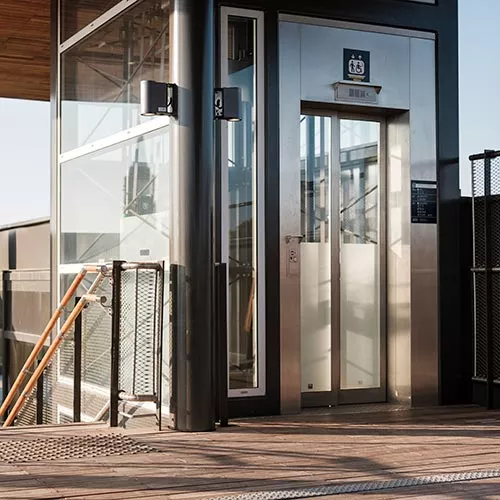
Doing more with rail
The transport sector is responsible for over one-third of France’s greenhouse gas emissions, making it the country’s biggest polluter. To meet the demands of the green transition, the sector must shift more toward rail, which generates only a fraction of those emissions.
And to make that happen, two major steps are needed.
First, we need to adapt to climate change to protect both our open-air infrastructure and the employees who maintain it, to keep passengers comfortable, and to continue offering safe, comfortable, and reliable service. Each SNCF Group company has crafted an action plan to address specific risks and vulnerabilities, such as soil subsidence, upheaval, flooding, and drought. Water is vital to operating a rail system, so we monitor use closely. And we’ve pledged to cut water consumption by 25% at our 100 most water-intensive sites by 2035.
Second, we need to expand accessibility by making trains and stations easier to use for cyclists and people with disabilities, and by introducing new mobility offerings for everyone. Our 24 metropolitan regional express service (SERM) projects are part of this effort. In rural areas, we’re investing in affordable, low-carbon solutions like light rail (Draisy, TELLi) and road-rail transport (FLEXY), which are especially well suited to lightly travelled routes.
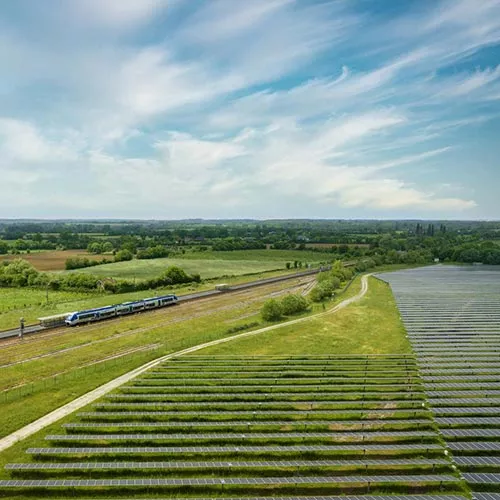
A stronger local presence
SNCF Group contributes €19.5bn to the French economy and plays a vital role in every region of the country. In 2024 alone, we made €16bn in purchases—97% of which went to French companies, including 13,000 small businesses and local companies. This spending supported 270,000 jobs at suppliers and subcontractors.
We’re also helping these partners transition to more sustainable models: environmental criteria make up at least 20% of our purchasing contracts, and we’ve added a carbon score to our calls for tender.
And lastly, as France’s second-largest property owner, we are a catalyst for industrial projects at the regional level. For instance, our subsidiary SNCF Renouvelables plans to install 1,000 hectares of solar panels on SNCF land, enough to meet 20% of our current electricity needs with solar power.
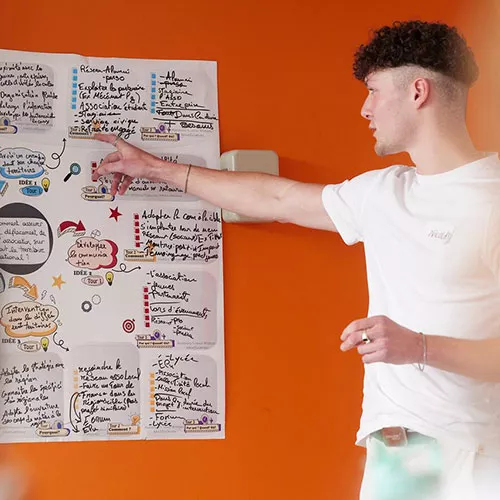
Putting people at the heart of everything we do
SNCF is already France’s top recruiter—we hired 18,500 people on permanent contracts in 2024 in 150 professions that support environmental protection and social equity. But our impact goes beyond recruitment.
We focus on 2 areas: helping young people and those at risk find their place in the working world, and making mobility safe, inclusive and accessible to all. We cultivate job-readiness by inviting our employees to participate in skills-sharing programmes, and the SNCF Foundation works with non-profit partners to help young people launch projects that will spur the green transition. Since 2021, we’ve backed over 1,000 such projects throughout France and signed multi-year partnerships in every region of the country.
We also help at-risk jobseekers get on their feet through programmes that create new businesses, provide back-to-work opportunities, and offer same-day pay under the French government’s TAPAJ scheme. We support mediation services, employer-sponsored volunteering, and educational outreach. In 2024, we trained 190,000 people in mobility-related issues, including 110,000 students.

270,000
indirect jobs supported nationwide

190,000
trained in mobility issues in 2024

€320m
invested in station accessibility each year since 2018
Shrinking our environmental footprint
Transport is at the heart of our business, and is a powerful force for positive change. But as a multinational company, we have a responsibility to do more. For a start, by 2030 we aim to reduce our greenhouse gas emissions from our transport operations by 30% and emissions from our buildings by 50% compared with 2015, when the Paris Climate Agreement was signed.
We will get there by eliminating emissions from rolling stock and switching to renewable energy. Shrinking our footprint also means diverting material from waste streams into the circular economy and protecting biodiversity without compromising passenger safety.
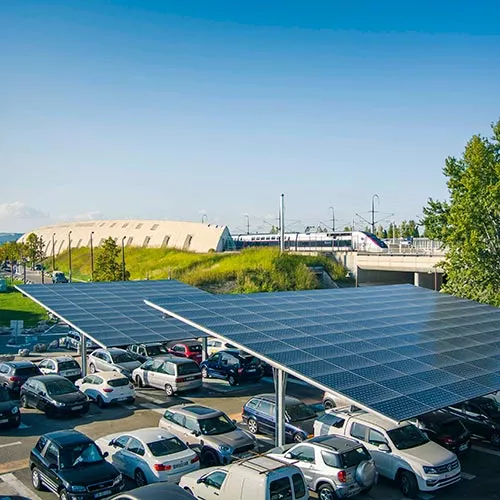
Decarbonizing our operations
We are committed to growing our business while actively bending the curve towards decarbonization. This includes introducing biofuels, hybrid TER trains powered by batteries or hydrogen, and a greener TER fleet—all in partnership with regional authorities. Energy-efficient driving and parking practices are also being rolled out.
Our Geodis and Keolis subsidiaries share this commitment to reducing emissions. As France’s largest industrial consumer of electricity, SNCF is expanding its use of renewable energy. In 2023, we created SNCF Renouvelables to develop solar power on our available land.
In addition to train station rooftops, carpark canopies and other surfaces that together offer some 1.1 million square metres suitable for solar arrays.
The final piece of the puzzle is SNCF Energie’s long-term renewable energy contracts. By the end of 2026, SNCF Voyageurs aims to meet 20% of its total energy needs through renewable sources.
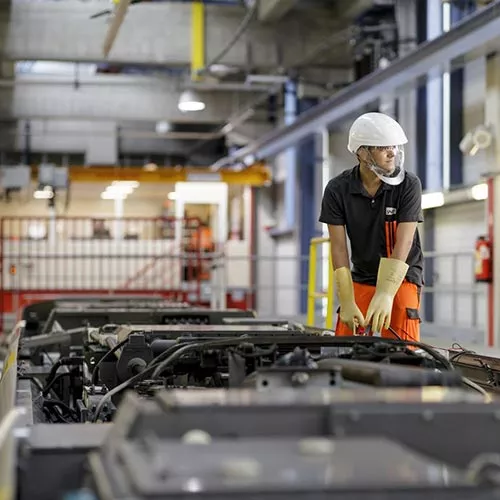
Expanding the circular economy
We are working to fight resource depletion and reduce the impact of materials production. One way we do this is by recovering materials and reusing materials at the end of their life cycle, including components from rolling stock.
Our ambition? Reuse or recycle parts from 12,000 wagons and locomotives between 2018 and 2030. So far, it’s working: each year we recover 55,000 tonnes of material—steel, copper and more—representing 95% of materials by volume. We reuse or recycle 100% of our rails, and more than 20% of the ballast from our tracks, with the rest recycled as base layers in road construction, for example. We are also behind a 100% French initiative to recycle our workwear, creating 1,500 jobs over the long term and helping to avoid 140,000 tonnes of CO2 emissions. SNCF Group is also expanding the lifespan of our equipment through proactive maintenance and repair. Every year, we restore 500,000 pieces of equipment. Our rail recycling centre in Beaune collects, identifies and refurbishes parts for reuse, storing them in a nationwide inventory, and supplies used components to our “circular economy lab” for the rail system.

Preserving biodiversity
SNCF’s daily operations span 28,000 km of rail lines, 3,000 stations, 12 million square metres of buildings, and more than 100,000 hectares of rail property—all intertwined with a multitude of ecosystems. That puts us in a critical position to minimize our impact and actively preserve biodiversity.
Since 2018, we’ve followed the Act4Nature International framework, making 14 commitments to galvanize our biodiversity efforts. One key initiative involves changing how we manage vegetation along tracks. In 2021 we stopped using glyphosate, replacing it with eco-friendly alternatives like landscape fabric and grazing. Rail lines can also present a danger to animals when they try to cross. To reduce this barrier effect, we install animal crossings and test systems to help prevent collisions. We’re doing the same in bodies of water to allow free movement of fish and other aquatic life.
Interview with Muriel Signouret, SNCF Group CSO
Share the article